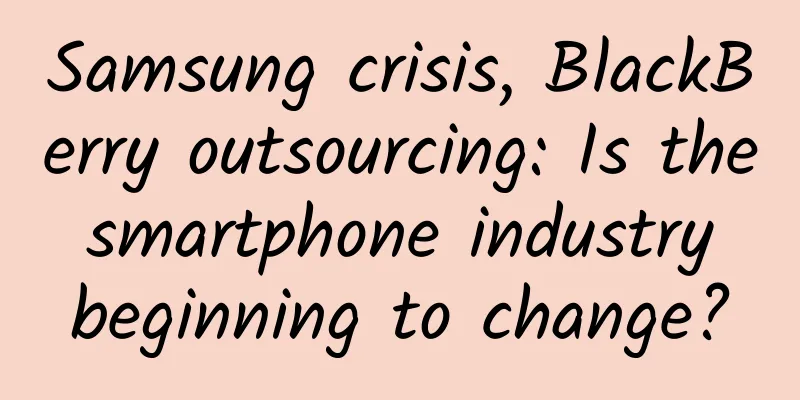Samsung crisis, BlackBerry outsourcing: Is the smartphone industry beginning to change?

|
As the recall of Samsung's Galaxy Note 7 phones continues to ferment, the industry seems to be particularly concerned about the impact and changes in the global smartphone market. Earlier, there were reports that the Samsung crisis was a major boon to its main competitor, Apple, and the opening of the iPhone 7 was the best proof of this; while other foreign media quoted industry insiders who believed that Apple did not gain an advantage because users had to adapt to a completely new operating system when switching from Samsung phones to iPhones. There were many different opinions at the time. Just as the industry was still discussing the Samsung crisis, news suddenly came that BlackBerry had officially announced that it would outsource its mobile phone business, which meant that the era of BlackBerry, once another heavyweight in the smartphone field, had officially come to an end. CEO Chen Shouzong had promised a year ago that if the company could not achieve profitability in the second quarter of this year, it would close its mobile phone business department. According to the financial report just released by BlackBerry, Q2 revenue was $334 million, a 31.8% decline from the same period last year; net loss was $372 million. BlackBerry ultimately failed to withstand the pressure. The experiences of Samsung and BlackBerry represent two completely different directions in the era of mobile Internet. Now that their names are intertwined in time and space, how will the industry's direction change? Before the explosion incident, Samsung's performance this year was like a spring breeze. The Galaxy S7/S7 Edge released at the beginning of the year has been advancing rapidly, with 77 million units shipped, a 5.5% increase, accounting for 22.4% of the global market share, and also achieved a revenue of $45.2 billion in Q2 2016, setting a record for the best financial report in two years. On the other side, Apple's situation is like the coming of winter. The financial report shows that Apple's revenue of $42.4 billion in the quarter fell by 15% year-on-year, and its net profit fell by 27%. The sales of iPhones decreased by a full 10.8 million units compared with the same period last year. Apple's weak performance is due to the fact that its product window period that has remained unchanged for several years has encountered a concentrated offensive from the entire Android camp, and Samsung's innovation and catch-up in product hardware have made it feel uneasy. The release of Note 7 before iPhone 7 is more like a sharp knife stabbing into Apple's main backyard. Now that the Note 7 explosion incident has occurred and iPhone 7 has been released and sold well, Apple can be said to have mixed feelings. Does the Samsung incident benefit Apple? According to Bloomberg, due to the safety warning issued by the U.S. Consumer Product Safety Commission (CPSC) and the global aviation management agency's ban on the use of Note7 on airplanes, investors panicked and sold, causing Samsung Electronics' market value to shrink significantly on September 9 and 12. However, this situation has since eased and Samsung's stock price has also tended to rebound. Although Apple's iPhone 7/7Plus sold well at the start, relevant data shows that its first-week sales did not achieve a breakthrough over the previous generation product 6S. In general, the Note 7, priced at 5,900 RMB, is Samsung's latest flagship product, positioned as a high-end model, and is intended to compete with Apple's iPhone 7 Plus. The continued fermentation of the Note 7 explosion recall incident will inevitably affect the shipment of Samsung's entire high-end product line. It will take some time for consumers to calm down and reshape the brand value. There are very few similar products in this price range, and the market share of brands other than Samsung and Apple is extremely low. The first choice to fill this vacuum period must be its original benchmark product, the iPhone 7 series. Will Samsung be surpassed by others in market share? This is difficult at present. Previously, Samsung, Apple, and Huawei accounted for 21.3%, 13.9%, and 8.6% of the global smartphone market, respectively. It can be seen that the market share of the second-ranked company is still a certain distance away from Samsung. Huawei has not yet formed a strong offensive in the overseas high-end smartphone market, and Apple has also limited ability to fill the gap left by Note 7. The iPhone business has basically reached saturation last year, and it is not easy to continue to boost it. What Apple needs to do now is to maintain the high profits and high returns of the iPhone, and market share is not what it cares about. Apart from Galaxy S7/S7 Edge/Note 7, Samsung's mid- and low-end models have a good presence in the global emerging smartphone market. In recent years, Chinese smartphone manufacturers such as Huawei have risen rapidly in overseas markets, but it will take some time to achieve scale. Before that, Samsung still has a strong brand influence and penetration. In addition, Samsung has leading strength in terminal chips and LCD panels, and has a rich foundation. The Note 7 incident is not a fatal blow, and it can still make a comeback after recuperation. Is the end of BlackBerry inevitable? Indeed, BlackBerry was once the leading brand in the smartphone market. In 2006, it occupied 48% of the North American mobile phone market share, which was half of the market. At that time, many people, from the president of the United States to ordinary people, were loyal fans of BlackBerry. However, in the subsequent competition in the mobile Internet era led by iPhone and Android, BlackBerry gradually lost, and its brand suffered a serious depreciation after 2012. BlackBerry has its own unique features. Its exquisitely designed QWERTY keyboard, two-way paging email system and strong encryption security once made it the first choice for business phones in the 2G era. As iOS has led smartphones to apps, and with the high bandwidth brought by HSPA and LTE, the pursuit of the ultimate integration of PC and mobile and the experience of functional trade-offs have become the core competitive direction of smartphones in this era. It can be said that BlackBerry was born at the wrong time in this era of "bad money driving out good money". The security and business convenience advantages of some of the functions of the BlackBerry system have become a niche in the current market where mobile smart devices are oriented to all consumers. This is very similar to the "hero's end" of Motorola and Nokia. Although BlackBerry has achieved a series of self-rescues under the leadership of Chen Shouzong, hoping to turn to the Android camp and try to revive, it has long been powerless in the face of the overall situation of the global mobile smart landscape that has already taken shape. After the respective incidents involving Samsung and BlackBerry, how has the balance of power in the smartphone operating system camp changed? Three sets of data show the global market share of Android and iOS. One is the latest Kantar Worldpanel report, which shows that Android's global market share reached 76%, while iOS's was 18.3%; the other is IDC's data at the end of last year, which showed that Android and iOS accounted for 81.2% and 15.8% respectively; in addition, NetmarketShare's monthly data updated to August this year showed that Android and iOS accounted for 66.87% and 27.2% respectively. The three companies have different modeling methods and collection channels, and NetmarketShare includes data on tablets and laptops. In addition to the two major mainstream systems, WP, Java ME, Symbian, BlackBerry, Tizen, etc. have a total market share of less than 5%. It can be seen that the market share of iOS and Android smartphones has been developing from 20:80 to a trend close to 19:10. The temporary withdrawal of Samsung Note 7 has a very limited impact on the change in the market share of the two. In addition, Apple's smartphone products cannot reach the mid- and low-end markets due to strategic positioning issues. Considering the further growth potential of models in this range in emerging markets in the future, Android's global market share will continue to grow slowly. On the other hand, as the market share of WP and BlackBerry systems gradually disappears, it is almost impossible for other systems other than the two major mainstream systems to have further growth. In addition, the current global smartphone market is almost saturated, and the form of smartphone products has also been fixed after years of development. It is almost impossible for any company or manufacturer to make major changes. This means that the 20:80 market share between iOS and Android will be maintained for a long time. The only thing that can break the balance of power between the operating system camps is the rise of new terminals (such as VR/AR), but this is difficult to foresee in the next five years. at last After the Note 7 incident, the only most obvious change in the entire smartphone landscape is that Samsung temporarily lost a certain share and became the biggest loser. Industry analysts believe that Samsung was hasty and aggressive in its competition with Apple, which was one of the main reasons for the crisis. In any case, Samsung learned a lesson, as the saying goes, haste makes waste. As for BlackBerry, its name may remain in history, and be listed in the Hall of Heroes in the history of science and technology together with Motorola and Nokia. As a winner of Toutiao's Qingyun Plan and Baijiahao's Bai+ Plan, the 2019 Baidu Digital Author of the Year, the Baijiahao's Most Popular Author in the Technology Field, the 2019 Sogou Technology and Culture Author, and the 2021 Baijiahao Quarterly Influential Creator, he has won many awards, including the 2013 Sohu Best Industry Media Person, the 2015 China New Media Entrepreneurship Competition Beijing Third Place, the 2015 Guangmang Experience Award, the 2015 China New Media Entrepreneurship Competition Finals Third Place, and the 2018 Baidu Dynamic Annual Powerful Celebrity. |
>>: Frequent frauds and quarrels have left Xiaomi with no choice but to rely on this straw
Recommend
The Mystery of the Pleiades Star Cluster: The Pleiades Nebula
Author | Wang Siliang Review | Zheng Chengzhuo Ed...
Father’s Day copywriting is here, how can brands take advantage of it?
How to write Father’s Day copy ? Let us give you ...
Android easily implements RecyclerView suspension bar
When we are browsing Instagram news, have you not...
WeChat update! You can finally block group chats
Hello my friends. I just had a day off yesterday ...
National Industrial Information Security Development Research Center: Panorama of Socialized Digital Supply Chain in 2021
Recently, the National Industrial Information Sec...
Does hair dye cause cancer? What is the difference between hair dyes that cost tens of dollars and hundreds of dollars?
When dyeing their hair, many people often look fo...
Will Bitcoin Become the New Safe-Haven Asset?
Bitcoin could become a safe-haven asset similar t...
National Day for People with Disabilities丨Today, we need to pay attention to this group of people...
August 11th of every year is the National Day for...
Nana Options Academy First Session
Nana Options Academy's first phase resource i...
Qiu Ma said, Guangdiantong optimization basics - 5 steps to play with Tencent resources
As one of the absolute mainstream channels for AP...
Sleep mini program function, how much does it cost to develop a sleep monitoring mini program?
Nowadays, due to increasing stress on people, the ...
Xiaohongshu "Product Operation" Analysis: How to guide new users to register?
Today’s article is the first in a series of artic...
Short videos put an end to the era of unlicensed operation. The industry under supervision must exercise self-discipline
Recently, the State Administration of Radio, Film ...
Don’t look for copywriting that takes advantage of the National Day, it’s all here!
The National Day holiday is finally coming. I hav...
How to build an activity operation framework in 4 steps?
In this article, the author will explain how to e...









